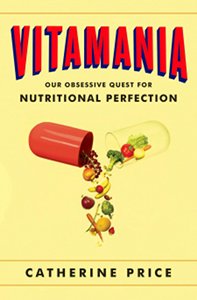Q & A with Catherine Price, author, Vitamania
Posted by Elena del Valle on October 21, 2015

Vitamania*
A 2011 Journal of Nutrition report indicates most consumers rely on foods fortified or enriched with synthetic vitamins for their essential micro nutrient intake. That is not surprising given that most of the vitamins we consume today are synthetic, according to Catherine Price, author, Vitamania. What may surprise many is that while in the early years of synthetic vitamin development the United States played an important role, today most of the market is under the corporate thumb of two European companies. And the majority of their production facilities are in China.
Last week in my note about Vitamania (see Journalist believes devotion to supplements keeps us from good health) I indicated Catherine Price, the author, had declined to answer questions. It had been two weeks since I had sent her questions and the deadline for replies was long past. Saturday, October 17, 2015, I received an answer.

Catherine Price, author, Vitamania*
Below are the questions and answers:
HispanicMPR.com
What was the main reason you wrote the book (other than the question your husband asked you in Lithuania)?
Catherine Price:
I wanted to gain a better understanding of a subject I took for granted. I also was curious about how the story of vitamins might change the way we should think about nutrition as a whole.
HispanicMPR.com:
In one sentence how do you define a vitamin or a nutritional supplement?
Catherine Price:
(Sorry, I can’t do it in one sentence!)
There’s no chemical definition for a vitamin — the word was coined in 1911 before they had been chemically isolated, and it turns out they’re not all part of the same chemical family. The public tends to define vitamins (of which there are only 13) as a chemical that we need in very tiny amounts, and that we usually get from our diets, that is necessary to prevent a specific vitamin deficiency disease, but there exceptions to each of these statements.
A dietary supplement (that’s the official term, not nutritional supplement) is defined by the Food and Drug Administration (which is the administration responsible for regulating America’s supplements) as “a product intended for ingestion that contains a ‘dietary ingredient’ intended to add further nutritional value to (supplement) the diet.”
There’s more info on what substances that definition includes here: fda.gov/AboutFDA/Transparency/Basics/ucm195635.htm
HispanicMPR.com:
Are you opposed to vitamins?
Catherine Price:
To clarify: we have a habit of using the word “vitamin” to refer both to the 13 essential vitamins (A, C, D, E, K and the 8 B vitamins) and to the much broader category of dietary supplements (there are some 85,000 dietary supplement products on the market in America). There’s no way you could oppose the 13 vitamins — we need them in order to survive! But I don’t think that most people need to take them as pills. As for dietary supplements, I’m not necessarily for or against them, but I have a lot of concerns about their safety, efficacy, and the authenticity of their ingredients.
HispanicMPR.com:
What was the greatest challenge to the book project?
Catherine Price:
A lot of the questions I thought were simple (what is a vitamin, how do vitamins work, what do they do, how much of each do we need) do not have answers.
HispanicMPR.com:
What was the biggest surprise?
Catherine Price:
That was also probably the biggest surprise. But once I got over the terror of not having solid answers to my questions, I realized that we should use this uncertainty as a lesson: vitamins are a great example of how little we actually understand about human nutrition. Their story has taught me to stop obsessing about the minutiae of nutrition, and to just eat naturally nutrient-dense food.
*Photos: Penguin Press, Sara Remington









